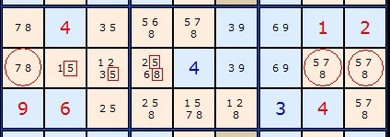
 |

|
Tuesday, January 17, 2006
 Confessions of a Sudoku Addict Well, not an addict so much as a chagrinned practitioner. At first, I pooh-poohed Sudoku as more tedious than challenging or fun. The easy ones were too easy, the difficult ones more painstaking than interesting. Then I noticed a couple of tricks to speed up the process ... and stumbled onto "evil" Sudokus at websudoku.com. Lord, what a pain they can be. To solve them without cheating or using trial and error, I had to learn even more kinds of tricks, which, frankly, can be even more painstaking. But these tricks surprised me, and now I'm semi-fascinated. And frustrated. Gads, this site claims the "average" "evil" score is twice as fast as any of my best "evil" times. So I'm wondering (a) has Sudoku gotten you, too? And (b), if you've had some trouble, would you like some tips? I'm figuring, if you're a fan, you know about process of elimination and cross-checking. ("Gotta be a 3 because this row has 1-2-4-8, box has a 9, and column has 5-6-7.") If not, you'll find good basic tips at sudoku.com. But do you know about pairs, triples and quads? (They can be naked or hidden.) How about X-wings, swordfish and guardians? If two squares in a row, say, are limited to the same two possibilities -- like 4 and 7 -- no other squares in that row can have a 4 or 7. That's a naked pair. (Same idea can work with 3, 4 or even more squares.) Further, if both squares in that pair are in the same box, no other squares in that box can have a 4 or 7. Finding these patterns seems to require pencilling in possibilities all over the board. Here's a well-presented explanation of using pairs, triples and quads, as well as a link to even more advanced strategies, which might be fascinating but strike me as too rare to be worth mastering. Have any better links or strategies to recommend? Or psychotherapists?
|
|
|
|